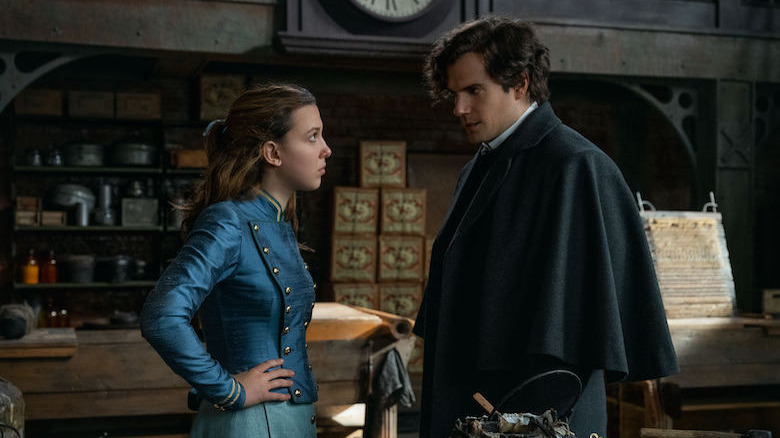Enola Holmes Got Netflix Sued By Arthur Conan Doyle's Estate Because Of Sherlock's Empathy
Public domain and copyright of intellectual material can be tricky these days. According to Cornell, intellectual properties typically take around 70 to 95 years to enter the public domain, though this can be changed due to court appeals, the countries in which the rights are held, and renewals of copyright. This is part of the reason why there is so much Sherlock Holmes content these days, and that is because most of the books and short stories featuring the character have entered the public domain.
The "Enola Holmes" movies on Netflix, which are based on the books written by Nancy Springer, feature the younger sister of Sherlock Holmes (Henry Cavill), Enola (Millie Bobby Brown). Coming from such a famous and skilled family, Enola shares many of the characteristics that make Sherlock one of the most prolific fictional detectives of all time. Able to infer, deduce, and investigate, Enola is a thorough and learned individual who has a strong sense of justice and moral compass, despite the fact that Victorian England isn't exactly keen on strong-willed women. However, it seems as if there was some legal trouble for Netflix due to Sherlock being compassionate and warm, and one where the courts had to get involved because of the nature of copyright laws and public domain.
Most Sherlock Holmes stories have become public domain, but not all
Per The Hollywood Reporter, the original "Sherlock Holmes" stories were written by Sir Arthur Conan Doyle in the late 1800s and early 1900s, which have inspired many different on-screen adaptations. Although many such stories have entered the public domain, some have not, which is the source of contention between Doyle's estate and Netflix. Doyle's estate argues that the still copyrighted stories feature a warm and compassionate version of Sherlock, while the ones that have become public domain feature a cold and calculating individual. The reason for this shift in personality is that Doyle had lost his son and brother in World War I, and he decided that Sherlock should have a bit more nuance after these real-life tragedies.
Red Points notes that United Kingdom copyright law only lasts 70 years after the death of the author, which means that all Sherlock works are free to use in the U.K., but that is only for that country. As such, there are 10 stories that are still under copyright in the United States, and Doyle's Estate argued that Netflix was taking elements from the still-copyrighted stories. This had not been the first time Doyle's estate has taken this issue up, and in 2013, they attempted to extract a licensing fee from Leslie S. Klinger because of an anthology series he was working on involving Sherlock Holmes. The courts eventually sided with Klinger and said that he was free to use Sherlock's character, but was barred from specific characters and story elements from the aforementioned 10 stories.
Doyle's estate argued that Enola Holmes was based on the copyrighted material
However, Netflix was sued by Sir Arthur Conan Doyle's estate on account of the "Enola Holmes" adaptation, which again argued that showing Sherlock as a warm and compassionate human being was actually a component of their copyrighted materials. The Guardian clarified that the legal suit brought forth against both Nancy Springer's novels and the Netflix adaptation claims that they made extensive use of this aspect, with the defendants arguing, "Even if the Emotion Trait and Respect Trait were original to copyright protected works, which they are not, they are unprotectable ideas. Copyright law does not allow the ownership of generic concepts like warmth, kindness, empathy, or respect, even as expressed by a public domain character – which, of course, belongs to the public, not plaintiff."
The case was eventually dismissed against "Enola Holmes," Netflix, and Springer, though it is unknown if there was a settlement outside of court or not. It is also important to note that all of the Sherlock Holmes stories will enter the public domain in the United States by the end of 2022, so this may have been an attempt to get one final payout for Doyle's estate. Either way, there is little in the way of further adaptations and stories inspired by one of the world's greatest fictional detectives.


